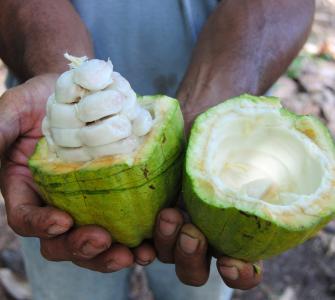CSF is working with the Rainforest Alliance (RA) to design and carry out research on the costs and benefits to farmers of RA certification. The Rainforest Alliance works to conserve biodiversity and improve livelihoods by promoting and evaluating the implementation of globally respected sustainability standards in a variety of fields. These include cocoa, coffee, and tea, among the most important crops grown in biologically important regions. RA certifies a major portion of global supply of some of these crops, including more than 130,000 cocoa farms in 11 countries.
The Rainforest Alliance has to date carried out and invited a significant body of research on the economics of implementing their sustainability standards. Findings are often positive. For instance, in Côte d’Ivoire, a 2011 study found that net income on certified farms was nearly four times higher than on non-certified farms.
However, research has to date focused largely on the impact of the standards as a package, with improvements in productivity due to improved farming practices playing an important role. CSF will contribute to this body of knowledge by helping RA begin to tease apart the benefits and costs of particular components of their package of interventions, in this case focused on the initial certification step and subsequent renewals. The research will draw on CSF’s skills in both rigorous economic analysis and practicality in generating reliable data in the field.
The research has implications for the strategies of a range of organizations working on sustainable agriculture, landscape mosaics, and certification. Many of these are keen to understand the particular benefits and costs to farmers of certification itself as they seek to ensure that their investments result in the greatest possible benefit for farmers and biodiversity conservation.
This project is made possible thanks to the Rainforest Alliance.

